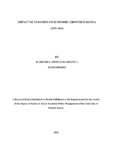| dc.description.abstract | This study analyzed the impact of taxation as a whole as well as the impact of indirect and direct taxes on economic growth using a simple endogenous growth model. The study used time series data for the period (1975-2014) to analyze the impact.
The study employed an endogenous growth model that was first employed by Egen and Skinner (1996). The model was improved by Lee Young (2004) who specified an econometric model to study the taxation effects on growth rate of per capita Gross Domestic Product (GDP). Later Ogbonna and Appah (2012) used the same econometric specification of the model but took a country specific approach to study the effect of tax reforms to growth of Nigerian economy.
Using the Ordinary Least Square (OLS) method, the study estimated the long-run cointegrating equation. Pre-estimation tests were carried out to determine homoscedasticity, serial autocorrelation, multicollinearity and normality of the variables.
The results revealed overall significance of the explanatory variables in explaining GDP. The coefficient of determination showed that 96.8 percent of the variation in GDP is explained by indirect taxes, direct taxes, other taxes, interest rate, foreign direct investment and net exports. The findings further revealed that the coefficient of indirect taxes was negative and individually significant in influencing the economic growth in Kenya in the short run. On the other hand, the coefficients of FDI and net exports were revealed to be positive and separately significant in affecting the economic growth in Kenya in the short run.
In view of these findings, it implies that indirect taxes increase consumption and reduce savings in Kenya. The implications of this is that policy makers should focus more on how to enhance international relations in order to attract FDI and also enhance export promotion so as to increase the exports which are good for economic growth. | en_US |



